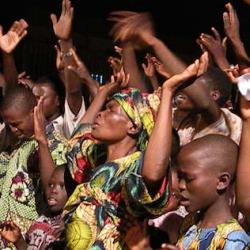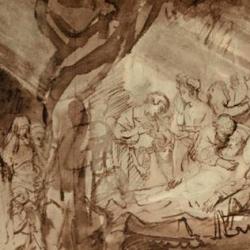Cheryl Exum’s Tragedy and Biblical Narrative (Cambridge, 1992) argues that there is a “tragic” dimension to the Bible, but in offering her initial explorations she actually seems to be supporting something like the opposite conclusion.
1) She stresses the importance of struggle against fate/gods/God as a key element of tragedy: “Tragic heroes have the HUBRIS ?Esometimes in authentic greatness, sometimes in delusion ?Eto defy the universe, not in a stoic defiance but in an insistence on their moral integrity (justified or not). Because they refuse, they will be broken . . . . It is not that there is ‘no way out whatsoever,’ as Japsers asserts, but that there is no way out without denying oneself. Saul refuses to acquiesce, he will hold on to the kingship at whatever the cost, rejecting the easy way out. There is a ‘way out’ and Saul’s son Jonathan, by yielding his right to the throne to David, shows what it is, but at the cost of his identity, which, as we shall see, becomes submerged into David’s” (p 12). Well, OK: In the sense that Saul proudly refuses to bow to Yahweh’s decree and is crushed, he is “tragic.” But the story is clearly endorsing precisely the “easy way out” ?Ethe way of Jonathan, the way of self-denial ?Ewhich is, of course, the very difficult way out, since it means effacing (but also eventually finding) one’s own identity before Yahweh and before the “rival,” David. Tragic heroism is the heroism of the one who refuses to submit, who does not take up his cross and deny himself. There are such people in the world, and in the Bible. But the Bible doesn’t present them as “heroes.”
2) Exum emphasizes that part of the struggle is a struggle to understand the fate that has brought the tragic consequences. Oedipus is a titanic figure because he is relentless in pursuing the truth of his situation. And again, the Bible has a “tragic dimension” in the sense that it recognizes the reality of this kind of struggle. Yet, again, the Bible does not leave it there, but reckons this struggle as the essence of original sin. It is the desire to be as God, to know as God, to have the complete and finished story as God does; it is a refusal of faith, a refusal to trust that God, however random and wild He may appear and be, will do right. The tragic hero refuses to trust God, and instead will accept his “fate” only if he can see all its causes and ramifications. The tragic protagonist longs to live by sight.
3) On guilt and innocence, Exum writes “Tragedy does nto clearly distinguish guilt and innocence. Kierkegaard speak of ‘authentic tragic guilt in its ambiguous guiltlessness.’ The heroes of tragedy are innocent in the sense that their misfortune is far greater than anything their deeds have provoked, and guilty both as members of a guilty society and by virtue of living in a world where such injustices simply happen. This is Ricoeur’s ‘guiltiness of being’ and Jaspers’ ‘guilt of existence’” (p 10). Perhaps this is just another way of rendering original sin. But if I’m following Exum, the “guilt of existence” is something the Bible explicitly denies. Existence as such does not render guilty; sin and therefore guilt ENTERED the world. This appears to be another indication that tragedy is inherently linked with gnosticism. Exum is explicit (p 9) that the “darkness” of the original creation represents a primal chaos that has the be “controlled and delimited by the deity” and yet remains “potentially threatening remnants of chaos.” Thus “If we seek the origin of evil, we find that it exists from the very beginning according to the creation stories.” Not. This is Genesis read through the eyes of Hesiod, or Genesis transformed into Theogony.















